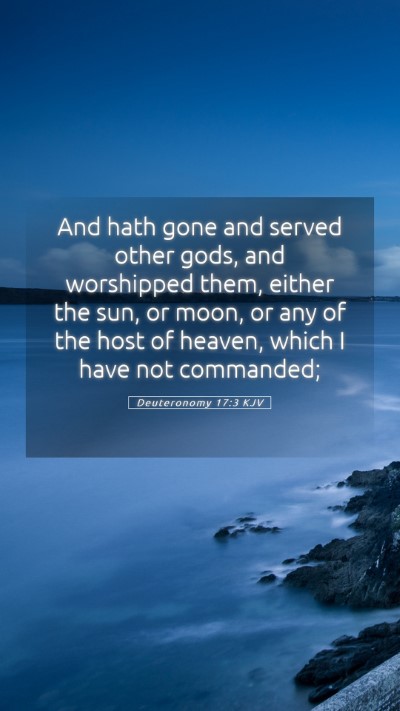Bible Verse Meaning: Deuteronomy 17:3
Verse: "And hath gone and served other gods, and worshipped them, either the sun, or moon, or any of the host of heaven, which I have not commanded;" (Deuteronomy 17:3)
Contextual Overview
This verse falls within a section of Deuteronomy where Moses instructs the Israelites on the necessity of fidelity to God, warning against idolatry and the consequences thereof. It emphasizes the prohibition of worshipping celestial bodies, which was a common practice among various ancient cultures.
Interpretation and Commentary Insights
General Understanding
Deuteronomy 17:3 serves as a direct admonition against idolatry, insisting that the Israelites remain faithful to the worship of Yahweh alone. The verse highlights the dangers posed by the allure of foreign gods and celestial worship, underscoring the importance of adhering to God's commandments.
Matthew Henry's Commentary
Matthew Henry discusses the delusion of worshipping created things rather than the Creator. He notes the implication of "served other gods" signifies a relational breach between the people and God. Worship in the form of ritualistic practices not commanded by God leads to severe consequences, urging the faithful to adhere strictly to divine instruction.
Albert Barnes' Commentary
Albert Barnes emphasizes the significance of the phrase "I have not commanded." He interprets this as a clear declaration that deviations from God's commands are not only wrong but profoundly dangerous. Barnes points out that the passage serves as a reminder of God's sovereignty and the need for loyalty in worship.
Adam Clarke's Commentary
Adam Clarke provides a historical context, pointing out that the worship of heavenly bodies was prevalent among surrounding nations. He highlights that Moses articulates a divine injunction intended to maintain the Israelites' unique identity and holiness. Clarke warns that accepting foreign worship practices could lead them to abandonment of their covenant relationship with God.
Applications for Bible Study
This verse and its interpretations invite several applications, encouraging deeper engagement in personal and communal Bible study. Here are some ways to apply the insights gained:
- Self-Examination: Reflect on personal practices of worship and dedication. Are there areas in life where allegiance to God is compromised by worldly influences?
- Group Discussion: Use this verse in Bible study groups to discuss the implications of idolatry in modern contexts. What modern-day 'idols' might distract from following God?
- Devotional Context: Integrate this verse in daily devotionals to encourage commitment to God's teachings above societal pressures.
Significance of the Verse
In the larger narrative of the Bible, Deuteronomy 17:3 serves as a crucial reminder of God's call to exclusivity in worship. It resonates with the overarching themes of loyalty, covenant relations, and the perils of syncretism. Therefore, understanding this verse is key to grasping the nature of faith as presented in Scripture.
Cross References
- Exodus 20:3-5: The commandment against idolatry and the call to exclusive worship.
- Deuteronomy 6:14: A warning against following other gods.
- 1 Kings 18:21: Elijah's confrontation with the people about their divided loyalties.
- Isaiah 44:9-20: A critique of idolatry and its foolishness.
- Acts 17:16-23: Paul's sermon in Athens addressing idolatry and unknown gods.
Conclusion
Understanding Deuteronomy 17:3 is essential for those seeking Bible verse meanings and Bible verse interpretations. By exploring the insights from various commentaries, believers can gain rich Bible study insights and apply the teachings in their daily lives. Avoiding idolatry remain crucial to the faith journey, reminding us to hold fast to the one true God.


